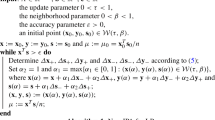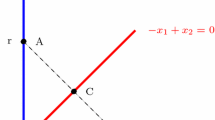Abstract
In this paper, we show that the number of main iterations required by the Iri-Imai algorithm to solve a linear programming problem isO(nL). Moreover, we show that a modification of this algorithm requires only\(\mathcal{O}(\sqrt {nL} )\) main iterations. In this modification, we measure progress by means of a primal-dual potential function.
Similar content being viewed by others
References
K.M. Anstreicher, A combined phase I-phase II scaled potential algorithm for linear programming, Mathematical Programming 52(1991)429–439.
I.I. Dikin, Iterative solution of problems of linear and quadratic programming, Soviet Mathematics Doklady 8(1967)674–675.
R.M. Freund, Polynomial-time algorithms for linear programming based only on primal scaling and projected gradients of a potential function, Mathematical Programming 51(1991)203–222.
R.M. Freund, A potential-function reduction algorithm for solving a linear program directly from an infeasible “warm start”, Mathematical Programming 52(1991)441–466.
C.C. Gonzaga, Polynomial affine algorithms for linear programming, Mathematical Programming 49(1990)7–21.
C.C. Gonzaga, Interior point algorithms for linear programming problems with inequality constraints, Mathematical Programming 52(1991)209–226.
C.C. Gonzaga, Path-following methods for linear programming, SIAM Review 34(1992)167–224.
P. Huard, Resolution of mathematical programming with nonlinear constraints by the method of centres, in:Nonlinear Programming, ed. J. Abadie (North-Holland, Amsterdam, 1967) pp. 207–219.
H. Imai, On the polynomiality of the multiplicative penalty function method for linear programming and related inscribed ellipsoids, IEICE Transactions E74(1991)669–671.
M. Iri and H. Imai, A multiplicative barrier function method for linear programming, Algorithmica 1(1986)455–482.
M. Iri, A Proof of the polynomiality of the Iri-Imai Method, Journal of Complexity 9(1993) 269–290.
N. Karmarkar, A new polynomial-time algorithm for linear programming, Combinatorica 4 (1984)373–395.
J. Renegar, A polynomial-time algorithm, based on Newton's method, for linear programming, Mathematical Programming 40(1988)59–93.
Gy. Sonnevend, An “analytical centre” for polyhedrons and new classes of global algorithms for linear (smooth, convex) programming, in:Lecture Notes in Control and Information Sciences 84, eds. A. Prekopa, J. Szelezsan and B. Strazicky (Springer, 1986) pp. 866–875.
J.F. Sturm, The scaling potential reduction method, Master's Thesis. Department of Econometrics, University of Groningen, The Netherlands (1993).
J.F. Sturm and S. Zhang, Potential reduction method for harmonically convex programming. Journal of Optimization Theory and Applications 84(1995)181–205.
K. Tanabe, Centered Newton method for mathematical programming, in:Proceedings of the 13th IFIP Conference, eds. M. Iri and K. Yajima, Tokyo (1987) pp. 197–206.
M.J. Todd and Y. Ye, A centered projective algorithm for linear programming, Mathematics of Operations Research 15(1990)508–529.
T. Tsuchiya and M. Muramutsu, Global convergence of the long-step affine scaling algorithm for degenerate linear programming problems, Research Memorandum 423, The Institute of Statistical Mathematics, Tokyo, Japan (1992).
H. Yamashita, A polynomially and quadratically convergent method for linear programming, Manuscript, Mathematical Systems Institute, Inc., Tokyo, Japan (1986).
Y. Ye, AnO(n 3 L) potential reduction algorithm for linear programming, Mathematical Programming 50(1991)239–258.
S. Zhang and M. Shi, On the polynomiality of Iri and Imai's new algorithm for linear programming, Journal of Qinhua University 28(1988)121–126.
S. Zhang, Convergence property of the Iri-Imai algorithm for some smooth convex programming problems, Journal of Optimization Theory and Applications 82(1994)121–138.
Author information
Authors and Affiliations
Rights and permissions
About this article
Cite this article
Sturm, J.F., Zhang, S. New complexity results for the Iri-Imai method. Ann Oper Res 62, 539–564 (1996). https://doi.org/10.1007/BF02206829
Issue Date:
DOI: https://doi.org/10.1007/BF02206829




